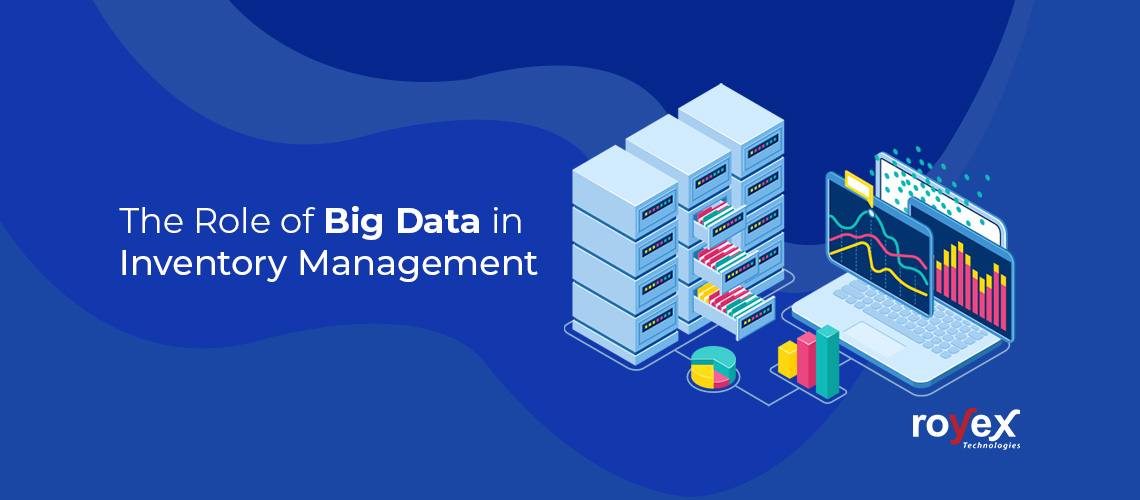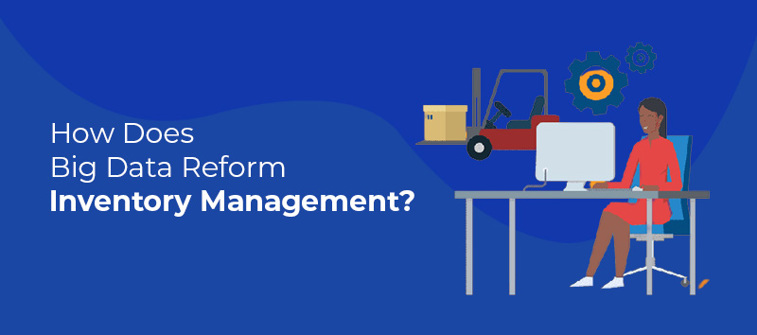
The Role of Big Data in Inventory Management
When your business is all about selling tangible products, inventory management comes into play to make a big difference. Maintaining the right amount of inventory is crucial to succeeding as a business owner. But, you have to process a numerous amount of data generated through social media, cellphones, transaction history, product information, and more to determine which product is necessary, when, and how many? It's almost impossible for human beings to analyze and make sense of this overwhelming data properly. Big data analysis can ease this entire process to improve inventory management. Read on to know the impact of big data in inventory management.
What Actually is Big Data?

Big data refers to an extremely large collection of data that is growing rapidly with time. This data is difficult to store and process because of its large volume and complex nature. With the right tools, you can analyze both structured and unstructured big data to reveal trends and patterns in human behavior.
Approximately 1.7MB of information is produced every second in the Digital Universe. At this rate, the total amount of data is likely to grow as big as 44 trillion gigabytes by the end of 2020. Though you don’t need all this data to run a business. A few examples of big data are as follows.
Stock Exchanges: All types of stock exchanges generate a great amount of data each day. For example, The New York Stock Exchange (NYSE) produces almost one terabyte of new data every day. This data is related to trade and commerce.
Social Media: Different social media depend largely on big data to operate more efficiently. Facebook generates more than 500 terabytes of new data every year. This data comprises pictures, videos, messages, comments, etc.
Jet Engines: A jet engine is able to generate over 10 terabytes of data within half an hour of flight time. With hundreds of flights operating per day, the total data accumulates a huge amount.
How Does Big Data Reform Inventory Management?

With the help of big data, you’ll get real-time information about stock availability, sales forecast, product returns, etc. All this information will help you improve operational efficiency and ensure a great shopping experience for your customers. Let’s learn more about the role of big data in effective inventory management.
Forecasting the Demand
Big data allows retailers and wholesalers to predict the demand for their products. You can determine a sudden spike or downturn in sales by analyzing big data. Besides, different seasons call for different customer needs. Big data can forecast such seasonal demands and helps business owners plan for holidays and festivals. You’ll get explicit data describing which product is a bestseller and which one remains unsold. Thus, you can know the actual demand and buy your product accordingly.
Monitoring Your Supply Chain
You can monitor which product is in stock and which one is likely to stockout soon with the help of big data. Big data keeps a record of everything in real-time. Preventing stockout is a critical factor in the ecommerce business. If you cannot sell a product because of the unavailability of stock, you will lose a customer and drive him/her to your alternative retailer. That may have an adverse effect on your business in the long run. Big data determines your safety stock and suggests an almost perfect reorder point for every item respectively so you never run out of stock.
Reducing Recall Damages

I hope you never face this situation. Having to recall products is very unfortunate. But, if it becomes inevitable, big data can assist you in minimizing the company’s loss as much as possible. You can find about any defective issues very quickly by monitoring different review sites, websites, social media, and the like. Early recalls will minimize the damage to a great extent. You can use number tracking software to easily find out products from which lots are defective. This will ultimately benefit every stakeholder.
Improving Customer Satisfaction

Big data can help you choose a more efficient shipping method. If customers return any product, you can put a system that will log the return reasons. Then, you will understand whether this is your fault or the carrier’s and take the necessary steps to prevent the same from happening in the future.
With the help of big data, you can also evaluate if the product descriptions are written correctly. Products with wrong descriptions are likely to be returned, as customers might be looking for something else.
While shipping a product, a warehouse employee may pick the wrong product mistakenly. A barcode scanner can instantly detect it and help the employee make amendments. This is possible because of big data.
Reducing Costs and Losses

To succeed as a retailer you need to keep a balance in inventory stocking so you have enough products to sell and at the same time, unnecessary products don’t waste your valuable warehouse space. Big data will let you know the minimum required amount of inventory to maintain a smooth cash flow and seamless selling process. Identify which products can incur additional costs in terms of storage costs, labor fees, shipping costs, insurance costs, and other inventory management costs. Then get rid of these products and avoid reordering them.
Inventory shrinkage means the loss of inventory due to theft, damaged products, miscounting, and obsolescence. You can integrate an inventory management system capable of tracking the movement of both your products and employees. This can reduce theft risks to a large extent. If shoplifting tends to occur in a specific department at a specific time, you’ll know that from data analytics. Take additional security measures to prevent future theft. Besides, you can track discrepancies in transactions and detect dishonest employees by using an analytics program.
Optimizing Prices
Before choosing a price for a particular product, you need to consider a few factors such as its purchase cost, stock availability, competitors’ price, etc. Most people are prone to conducting online research before making a buying decision. So, you need to fix a fair price that will render you enough revenue at the same time customers will feel content. This should be a win-win situation. Big data analytics can help you select the right price by assessing these factors thoroughly. Moreover, big data can ensure that you’re offering the same prices in both your brick and mortar stores and ecommerce stores. This is a critical factor to satisfy your customers. Any mismatch found in physical stores and online stores may cause great harm to your reputation.
Facilitating Cross-selling
When a customer buys something online, if you recommend relevant products to his/her search queries or the products added to the shopping cart, chances are high that he/she will buy any of the suggested products too. This is called cross-selling. If you enable big data on your website, it can automatically recommend such products and increase cross-selling.
Assessing Suppliers Performance

An irresponsible supplier can cause serious damage to your business by delaying delivery or providing low-quality products. That’s why you need to maintain a healthy relationship with your suppliers. Big data allows you to be aware of the overall situation, including the state of delivery, quality of products, and product prices. This helps a user determine vendor performance. Evaluate your supplier’s performance and take necessary action to improve your inventory management.
Big data merged with IoT and AI can bring revolutionary changes to your warehouse management process. With the help of IoT-enabled devices, you’ll get a more effective, intuitive, responsive, optimized, and engaging inventory management system. It's high time to adopt automated methods in every aspect of your business. Integrating big data with your inventory management system can be the first step. You’ll succeed in this era only if you embrace new technologies.
Royex Technologies, a leading Website, Mobile App and E-commerce Development Company in Dubai, have certified developers who can bring reality to any of your ideas. We have experience in developing over 300 projects for our clients in the GCC which includes several E-commerce websites, service applications, etc, so we have the expertise perfect for your e-commerce requirements. If you need an eCommerce website with SEO optimizations, feel free to call us at +971566027916 or mail us at info@royex.net and we can send you a proposal based on your idea.






